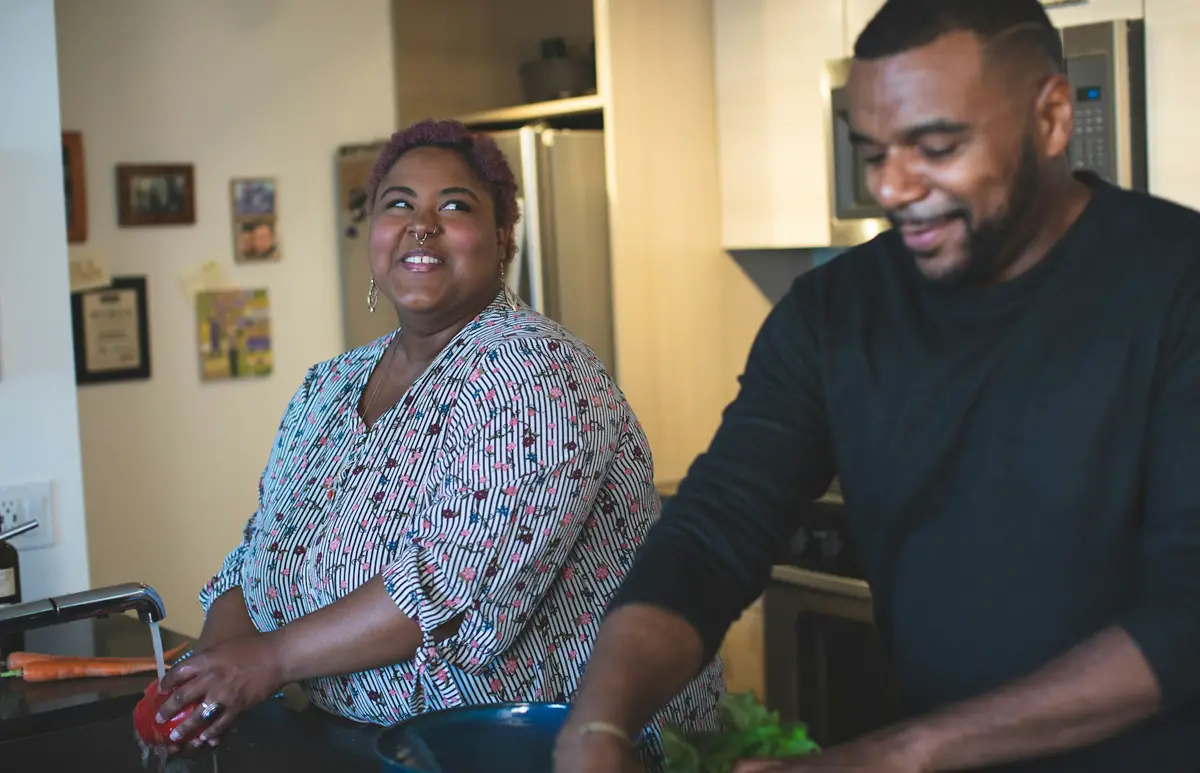What Can a Love Language Test Reveal About Your Partner?

The idea of love languages gave couples a powerful way to name and explain gaps in their communication. Over time, this framework has been reduced to fun internet relationship tests and quizzes, but in reality, it can tell a lot about a person’s background and their deeper emotional needs.
It’s a paradox for two people to care deeply about each other yet miscommunicate because they speak different love languages. If you have always wanted to know what’s behind your partner’s love language, how it formed, and how to respond to it with deeper awareness, this article is the right choice.
Why Sometimes We Might Misread Our Partner’s Love Language
It’s easy to assume we know what makes our partner feel loved. They could reach for our hand, so we assume touch must be their love language. Or maybe they take care of our to-do list, so we think that’s what they crave acts of service in return.
Love isn’t always expressed the same way it wants to be received. Sometimes, we might forget that our partners shouldn’t have the same preferences. If you’re curious about your dynamic, taking a structured love language test for couples can offer surprising insights. You can also take this relationship test with your partner, compare results, and reflect on your habits. It’s a great way to spend quality time and explore each other’s inner worlds.
In some cases, people might not even be aware of their own love language because of masking, trauma, or learned roles. For example:
● Someone who grew up being praised for productivity might give acts of service but crave emotional reassurance on the inside.
● A partner who’s experienced neglect might default to being “low maintenance,” but still deeply crave words of affection.
● People-pleasers may mirror what others want, masking their true needs in the process.
This is why taking the love language test matters. It offers language for emotions that might otherwise stay unspoken. It’s possible for couples to unknowingly fall into the trap of projecting their own preferences onto their partner.
We might also rely on stereotypes, such as assuming men prefer physical touch. While these generalizations might seem intuitive, they obscure the real emotional needs underneath. Here are some actual signs you may be misreading your partner’s love language:
● They do a lot for you, but seem withdrawn or dissatisfied emotionally.
● Your thoughtful gestures don’t land the way you hoped.
● They could say things like “You never listen,” even though you show affection in other ways.
● You feel confused: “I’m doing everything right, but it’s not enough.”
Understanding someone’s actual love language means successfully passing the relationship test. The biggest breakthrough comes from realizing that your significant other carries their own experience and knowledge, which may include trauma or cognitive differences. Therefore, allow them to make mistakes, change the way they express love, and continue exploring them.
Understanding Your Partner by Their Love Language
When your partner prefers thoughtful gifts or always wants to cuddle, it’s not just about how they like love, it’s about why it matters to them. Each love language reflects something deeper: unmet emotional needs, early relationship dynamics, or how they learned safety and connection growing up.
We express love in the way we want to receive it. Hughes and Camden’s research from the Agness Scott College proved that partners who use their partners’ love language, on average, get 25% more affection and love from them [1]. Moreover, it’s a great predictor of the future success of the relationship.
If Your Partner’s Love Language is Gift-Giving
Surprisingly, gift-giving is not about gifts. A well-timed gift says, “I saw this and thought of you.” If a love language test shows your partner appreciates gift-giving, they’re not materialistic.
The roots of this love language trace back to early moments when gifts symbolized safety or care for them. Perhaps their caregiver brought small surprises during stressful times. Or the person could grow up with limited resources and now appreciates everything you get them.
Making thoughtful gifts also strengthens relationships as a whole. You, as a giver, get a lot of benefits as well, such as health benefits! Cleveland Clinic reports that the act of giving produces brain chemicals like serotonin, dopamine, and oxytocin, which help in regulating blood pressure. [2].
Gifts shouldn’t be about costly items like watches, designer bags, or expensive trips. A favorite snack after a hard day or a note tucked in their bag is just as emotionally crucial as a well-spent date. Don’t wait for birthdays or holidays to get something for your boyfriend or girlfriend. However, missing special occasions can feel like being forgotten altogether to them.
My Partner Appreciates Quality Time. What Do I Do?
For someone who values quality time, presence is everything. They feel most loved when you’re truly with them. Sometimes, the need for quality time might be hard to spot. Taking a relationship test together may pinpoint that for you and become a great bonding opportunity.
If your significant other values quality time, they might crave uninterrupted moments of connection. Grand gestures are unnecessary if you can just talk through your feelings during a romantic night with a bottle of wine. Here’s how to meet your partner’s quality time needs:
● Plan regular one-on-one time without distractions. Even 20 minutes of full presence makes a difference.
● Create tech-free zones during shared moments. Have meals without background noise, enjoy evening walks without your smartphones, or have some bedtime chats before going to sleep.
● Try a weekly “connection ritual.” An example can be a Sunday coffee catch-up or an end-of-week walk, when you will summarize the week and plan another one.
● Ask thoughtful questions. Try to give your full attention to their answers. If your significant other values quality time showing interest in them creates intimacy and makes you more thoughtful.
How to Express Physical Touch?
Physical touch isn’t just about sex. It can be the primary way your partner gives and receives emotional connection. When your partner values physical touch, they’re not just being affectionate for the sake of routine.
A study published in the Personality and Social Psychology Review found that affectionate touch in relationships is an important mechanism to strengthen relationships and even reduce stress [3].
Maintaining affectionate physical touch without seeming obnoxious can be challenging. If a love language test indicates your partner has a higher need for physical touch, here’s what we can offer to support them:
● Offer non-sexual touch regularly. A hug before leaving the house, resting your hand on their knee during a conversation, or brushing their hair back when they’re stressed.
● Be mindful of their body language. A physical gesture speaks louder than a lengthy talk. Look if your partner shrugs their shoulders, frowns, or crosses their legs.
● Hold them during emotional moments. It’s the moment they feel the most vulnerable, and physical touch soothes their nervous system.
● Respect boundaries. Physical touch should never be used to “fix” something they’re not ready to address.
How to Appreciate a Partner Whose Love Language is Words of Affirmation?
For someone whose love language is words of affirmation, language is connection. Women aged 45 and older are most likely to relate to this love language [4]. They feel most loved when their partner expresses appreciation, recognition, or affection out loud.
A person who needs verbal affirmation doesn’t need flattery. The steady presence of kind, validating words makes them feel seen.
For them, silence in a relationship can be louder than conflict. Perhaps your partner’s parents couldn’t provide them with unconditional love. And now, if they don’t hear love, they may not feel it. To connect with someone who values verbal affirmation:
● Say “I appreciate you” and specify why.
● Share small compliments daily, not just on special occasions.
● Thank them even for their everyday contributions.
● Avoid sarcasm, passive-aggressive comments, or criticism in emotional moments, as these can cut deeper than intended.
Results from the love language test might provide you with more hacks. One tip from us: Don’t be poetic, be sincere. For a partner wired for words, love needs to be heard clearly.
What Is Hiding under Acts of Service?
For partners who value acts of service, love is best expressed through action. For some reason, your partner may need to prove their love for you and vice versa. This love language may stem from a background where support wasn’t consistent or had to be earned.
Some people say that people who appreciate acts of service are the hardest to please. But even unloading the dishwasher or filling up their car builds trust and relieves the tension. If your partner values acts of service, here are a few ways to connect meaningfully:
● Follow through on commitments. Keeping promises, even the smallest, is very important for a person who appreciates actions over words.
● Offer help before they ask. You are not a mind-reader, but you can learn your partner’s routine and anticipate their needs. Believe that if you cross something off their to-do list, they will never forget it.
● Help them if they are overwhelmed. That’s actually how all people would like to be treated. We want someone to be thoughtful of our struggles and be there for us emotionally and physically.
● Cook their favorite meal, take care of logistics, or make life easier in a tangible way.










